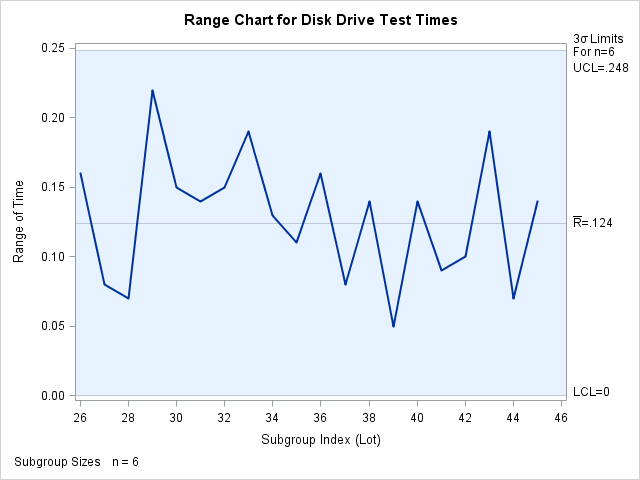RCHART Statement: SHEWHART Procedure
Reading Preestablished Control Limits
Note: See Range Chart (R Chart) Examples in the SAS/QC Sample Library.
In the previous example, the OUTLIMITS= data set Disklim saved control limits computed from the measurements in Disks. This example shows how these limits can be applied to new data provided in the following data set:
data Disks2;
input Lot @;
do i=1 to 6;
input Time @;
output;
end;
drop i;
datalines;
26 7.93 7.97 7.89 7.81 7.88 7.92
27 7.86 7.91 7.87 7.89 7.83 7.87
28 7.93 7.95 7.90 7.89 7.88 7.90
29 7.97 8.00 7.86 7.89 7.84 7.78
30 7.91 7.93 7.98 7.93 7.83 7.88
31 7.85 7.94 7.88 7.98 7.96 7.84
32 7.86 8.01 7.88 7.95 7.90 7.89
33 7.87 7.93 7.96 7.89 7.81 8.00
34 7.87 7.97 7.95 7.89 7.92 7.84
35 7.92 7.97 7.90 7.88 7.89 7.86
36 7.96 7.90 7.90 7.84 7.90 8.00
37 7.92 7.90 7.98 7.92 7.94 7.94
38 7.88 7.99 8.02 7.98 7.88 7.92
39 7.89 7.91 7.92 7.90 7.94 7.94
40 7.84 7.88 7.91 7.98 7.87 7.93
41 7.91 7.87 7.96 7.91 7.89 7.92
42 7.96 7.93 7.86 7.93 7.86 7.94
43 7.84 7.82 7.87 7.91 7.91 8.01
44 7.93 7.91 7.92 7.88 7.91 7.86
45 7.95 7.92 7.93 7.90 7.86 8.00
;
The following statements create an R chart using the control limits in Disklim:
ods graphics on; title 'Range Chart for Disk Drive Test Times'; proc shewhart data=Disks2 limits=Disklim; rchart Time*Lot / odstitle=title; run;
The ODS GRAPHICS ON statement specified before the PROC SHEWHART statement enables ODS Graphics, so the R chart is created using ODS Graphics instead of traditional graphics. The chart is shown in Figure 18.77.
The LIMITS= option in the PROC SHEWHART statement specifies the data set containing the control limits. By default, this information is read from the first observation in the LIMITS= data set for which
-
the value of
_VAR_matches the process nameTime -
the value of
_SUBGRP_matches the subgroup-variable nameLot
Figure 18.77: R Chart for Second Set of Disk Drive Test Times (ODS Graphics)

All the ranges lie within the control limits, indicating that the variability in disk drive performance is still in statistical control.
In this example, the LIMITS= data set was created in a previous run of the SHEWHART procedure. You can also create a LIMITS= data set with the DATA step. See Example 18.28 and LIMITS= Data Set for details concerning the variables that you must provide.
